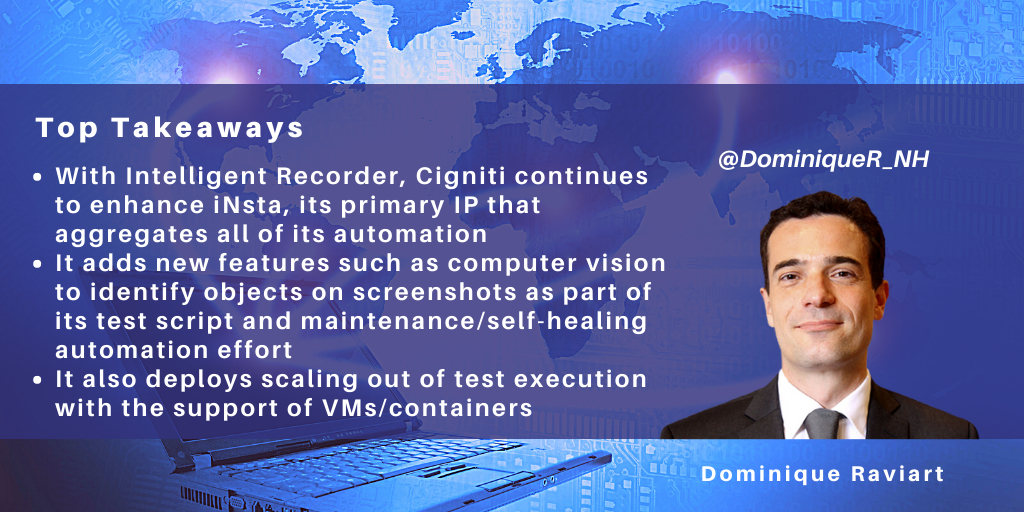Search posts by keywords:
Filter posts by author:
Related NEAT Reports
Other blog posts
posted on Dec 12, 2022 by Dominique Raviart

Software testing continues to be an industry of contrasts: the primary activity, functional testing, remains a human-intensive activity, despite the accelerated adoption of continuous testing (i.e., bringing functional automation as part of DevOps).
But testing has also grown in a highly specialized set of activities, earning the name of Quality Engineering (QE), ranging from support activities, test data and test environment management, shifting both left (early in the software lifecycle) and right (to application monitoring and now site reliability engineering).
Nevertheless, the most exciting event in QE remains the usage of AI to automate the creation and maintenance of test scripts. We think that despite somewhat limited adoption, automated script creation has the potential to redefine the QE industry.
Test Script Maintenance Will Become Easier
We talked to Cigniti about its recent investment in its iNSta IP to automate test script creation and maintenance. Cigniti repositioned iNSta two years ago, from a testing framework, as its primary automation point, aggregating all automation and specialized services. The company promotes it as an 'AI-enabled low code scriptless test automation platform'.
Now the company has enriched iNSta with its core Intelligent Recorder.
iNSta's Intelligent Recorder will create test scripts on the fly when a user goes through a transaction in an enterprise application. It will identify UI objects and build an object library to maintain test scripts. Intelligent Recorder will scan the UI for each release and identify changes in the UI. The maintenance of such test scripts is, we think, of high importance. Cigniti finds that 5% of test cases are outdated or not in sync with the current release and will lead to false positives or testing failures. The company continues to add incremental enhancements: should Intelligent Recorder fail to recognize that an object has changed, it will use computer vision to compare screen images of two different releases, identify the objects that have changed, and amend its object library.
Cigniti also accelerated the speed of execution of iNSta, relying on conducting test script execution in parallel across several VMs and containers. The company will add VMs/containers automatically through a scaling-out approach. With this offering, Cigniti wants to address development organizations operating in agile/DevOps with requirements for short testing timelines. It also targets applications that require extensive use of AI, which typically slows down test execution.
Cigniti also complements iNSta with automated test script creation, using NLP technology to translate English-written test cases from Excel and ALM into test scripts. Cigniti has created a dictionary and will custom dictionaries for its clients. The company finds that its English language translation AI model brings more benefits than the Gherkin language, as BDD requirements are done by testing specialists and not by business users. Nevertheless, Cigniti is also integrating its BDD framework in iNSta.
A strength of iNSta is that the Intelligent Recorder and the NLP translation are interoperable, and users can go back and forth between the two approaches. This maximizes, we think, the possibility of automation and helps with test script democratization.
New Opportunities with E2E Testing
AI is also opening QE to new testing opportunities. To a large extent, functional testing tools such as HPE/Micro Focus UFT and open-source Selenium have focused on one application technology. Still, they cannot operate across mobile apps, web, client-server, and mainframe applications.
Cigniti has expanded iNSta's Intelligent Recorder from web applications to mobile apps and client-server applications. This opens more automated test script opportunities. It also opens up business process/E2E automation opportunities. Several industries, including telecom, banking, retail, and government, have processes operating across different application technologies. Until now, E2E testing had to be manual or relied on RPA tools/bots.
Cigniti also intends to host iNSta on the cloud and sell it as a PaaS tool to favor its adoption. In the meantime, it will expand the Intelligent Recorder to SaaS applications (e.g., Salesforce), mainframe applications, and APIs.
We think the QE industry now has the technology to challenge the requirement-test case-test script model, and now is the time to focus on organization adoption. Cigniti highlights that initially, clients are hesitant to adopt iNSta due to organization and skill changes. We expect Cigniti to spend time with its clients evangelizing the market, relying on its QA consulting unit, and helping clients on OCM. More than ever, testing (and IT) is also about people's buy-in. We think tools like iNSta will help testers focus on more gratifying tasks such as analysis and remediation. This is good news for the industry.
